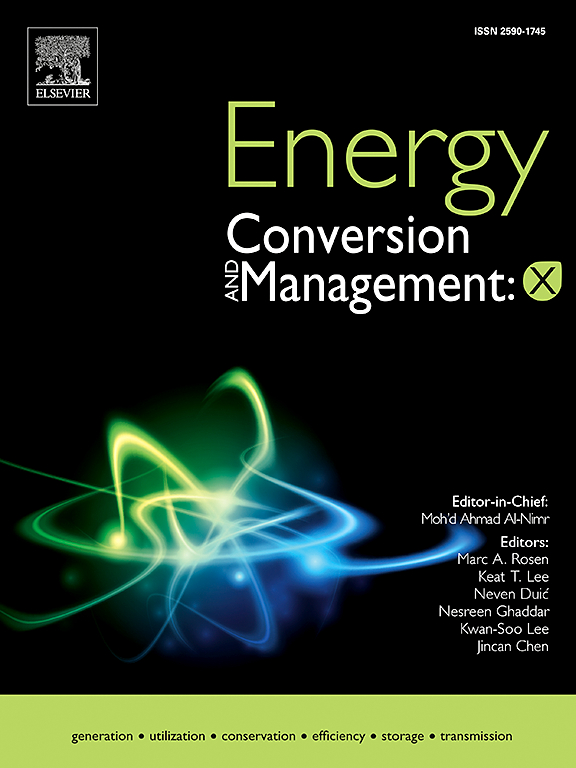基于人工智能的综合能源系统管理规划预测模型:南非前景探讨
IF 7.1
Q1 ENERGY & FUELS
引用次数: 0
摘要
据预测,从 2010 年到 2070 年,南部非洲的区域能源需求将增加 10 到 14 倍。因此,为了解决能源需求激增的问题,南非制定了综合资源计划,其中包括利用可再生能源来增加电力供应和减少国家的碳足迹。然而,由于可再生能源的可变性和不确定性,将可再生能源纳入电网给系统运营商带来了不同的动力。因此,准确的需求和发电预测对于安全运行和确保连续供电至关重要,这也是消费者的要求。由于地球大气层的复杂性、天气预报的不确定性以及特定地区的标准,传统的预测模型存在局限性。因此,机器学习、深度学习和其他人工智能技术是改进经典预报模型的诱人可能性。本研究全面回顾了基于人工智能的发电潜力和负荷需求预测模型的相关工作,以实现能源资源的智能管理和规划。研究方法包括利用人口、政策和社会技术信息等标准,搜索研究数据库和其他来源有关特定地点能源资源管理的研究、报告和出版物。因此,审查研究强调了人工智能预测分析如何加强长期能源资源潜力和负荷预测,从而提高南非电力部门的绩效并促进综合能源系统管理的实施。本文章由计算机程序翻译,如有差异,请以英文原文为准。
Artificial intelligence-based forecasting models for integrated energy system management planning: An exploration of the prospects for South Africa
The regional energy demand for Southern Africa has been predicted to increase by ten to fourteen times between the years 2010 and 2070. Thus, to address the proliferation of energy demand, South Africa’s integrated resource plan, which includes using renewable energy sources to increase the electricity supply and reduce the country’s carbon footprint, has been formulated. However, integrating renewable power into the power grid brings different dynamics for the system operators, as renewable power sources are variable and uncertain. Thus, accurate demand and generation forecasting become critical to the safe operation and ensuring continuity of supply, as consumers require. Due to the complexity of the earth’s atmosphere, weather forecasting uncertainty, and region-specific criteria, traditional forecasting models are limited. Thus, Machine Learning, Deep Learning, and other artificial intelligence techniques are attractive possibilities for improving classical forecasting models. This study comprehensively reviewed relevant works on AI-based models for generation potential and load demand forecasting toward intelligent energy resource management and planning. The approach involved searching research databases and other sources for studies, reports, and publications on location-specific energy resource management using criteria such as demography, policy, and sociotechnical information. Consequently, the review study has highlighted how AI predictive analytics can enhance long-term energy resource potential and load forecasting toward improving electricity sector performance and promoting integrated energy system management implementation in South Africa.
求助全文
通过发布文献求助,成功后即可免费获取论文全文。
去求助
来源期刊

Energy Conversion and Management-X
Multiple-
CiteScore
8.80
自引率
3.20%
发文量
180
审稿时长
58 days
期刊介绍:
Energy Conversion and Management: X is the open access extension of the reputable journal Energy Conversion and Management, serving as a platform for interdisciplinary research on a wide array of critical energy subjects. The journal is dedicated to publishing original contributions and in-depth technical review articles that present groundbreaking research on topics spanning energy generation, utilization, conversion, storage, transmission, conservation, management, and sustainability.
The scope of Energy Conversion and Management: X encompasses various forms of energy, including mechanical, thermal, nuclear, chemical, electromagnetic, magnetic, and electric energy. It addresses all known energy resources, highlighting both conventional sources like fossil fuels and nuclear power, as well as renewable resources such as solar, biomass, hydro, wind, geothermal, and ocean energy.
 求助内容:
求助内容: 应助结果提醒方式:
应助结果提醒方式:


